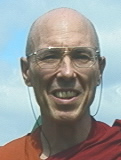 |
| What would the Buddha say about Buddhism? |
There are TWO Buddhisms, the "Teaching of the Elders" (Theravada), the "elders" being the immediate circle of fully enlightened monastic disciples who followed the historical Shakyamuni Buddha, and the later "Big Vehicle" (Mahayana), a kind of Hindu (Brahmanism)-Buddhism syncretism.
Mahayana (90%) denounced every other Buddhist school as being a "lesser vehicle" until all of these sects/schools went extinct. Theravada (10%) is not one of these "Hinayana" schools but is nevertheless referred to as one by careless accusers.
What could these two paths -- the one the Buddha explicitly taught and encouraged, and the other more modern interpreters have derived and taken as implicitly taught by the Enlightened One, mixed in with a lot of Asian cultures and practices that have nothing to do with the Buddha's original teachings -- have in common that one should want to bridge them?
Who is Bhikkhu Bodhi?
 |
| Scholar-monk Ven. Bodhi |
He was drawn to Buddhism when he was in his early 20s. After obtaining his doctorate, he traveled to Sri Lanka, where he received novice ordination in
1972 and full ordination in 1973, both under the late Ven. Ananda Maitreya, the leading Sri Lankan Theravada scholar-monk of recent times.
He was appointed editor of Sri Lanka's Buddhist Publication Society in 1984 and its president in 1988.
Ven. Bodhi has many
important publications to his credit, either as author, translator, or
editor, including The Buddha — A Translation of the Middle Length Discourses (co-translated with Ven. Nanamoli (1995), The Connected Discourses of the Buddha — a New Translation of the Samyutta Nikaya (2000), and a popular anthology entitled In the Buddha’s Words (2005).
In
May 2000 he gave the keynote address at the United Nations on its first
official celebration of Vesak (the thrice-blessed day of the Buddha’s birth,
great enlightenment, and final passing).
He returned to the U.S. in 2002 and
currently resides in Upstate New York at Chuang Yen Monastery and teaches there and at Bodhi Monastery.
He is currently the chairman of Yin Shun Foundation and very active in the Buddhist Global Relief. More



























































































































































































































































No comments:
Post a Comment